This piece is part of a series titled “Nonstate armed actors and illicit economies in 2023” from Brookings’s Initiative on Nonstate Armed Actors.
On January 10, Haiti lost its last vestige of democratic representation when the term of its 10 senators, who nominally represent 11 million people, expired. Now there are no elected members of the house or senate. Haitian Prime Minister Ariel Henry, who assumed office after the July 2021 assassination of President Jovenel Moïse, has not been elected either.
Amid a profound political crisis, Haiti remains gripped by vicious gangs who dominate daily life through their warfare, sieges, and extortion. The Haitian National Police (PNH) and Haitian politicians, both deeply interconnected with the gangs, are no longer able to hold the criminals on a leash. Close to 5 million Haitians, nearly half the country’s population, face acute hunger. The country also struggles with cholera, high prices and shortages of food, fuel, and other necessities, while misery and violence drive refugee outflows.
Holding reasonably free and fair elections is an important step. However, even if a broad-based consensus on political transition among the polarized political sides could be reached, the enfeebled state cannot provide security for elections without: a) problematic negotiations with the gangs, b) robust external intervention, or c) both. Despite repeated calls, including from Henry, there is little appetite abroad for staffing an international force which, even more than previous troubled ones, could rapidly become mired. Many Haitians themselves have little enthusiasm for an intervention. Whether or not an external intervention is ultimately cobbled together in 2023, the gangs will remain powerful.
The troubled politics
Not since the bloody dictatorship of Jean-Claude “Baby Doc” Duvalier ended in 1986 has Haiti been without any elected representatives. Haiti’s electoral commission and Supreme Court don’t function. The assassination of Moïse, who frequently resorted to illegitimate tools to govern, is not fully resolved although many have been charged. Haitian governance is highly centralized and corrupt, and the mismanagement of Haiti’s resources mostly benefits the urban elite.
Henry is at loggerheads with vast segments of Haitian society. Among his principal opponents is the Montana Accord, a coalition of Haitian NGOs, civil society members, and politicians that has received widespread approval from within Haiti and the Haitian diaspora.
In December, Henry and a rival coalition of businesses and NGOs announced a transition plan to hold elections in February 2024, and create an interim high transitional council, advised by civil society. The transition arrangements would also restaff the Supreme Court, the electoral commission, and conduct constitutional reform.
Other civil society actors and political parties reject the plan as illegitimate.
The vicious gangs
There are some 200 gangs in Haiti, about half in the capital, Port-au-Prince. Currently, the two main gang alliances are between the G9 an Fanmi e Alye, led by the notorious former police officer Jimmy “Barbecue” Chérizier, and the GPèp la, led by Gabriel Jean Pierre, known as Ti Gabriel.
Often numbering hundreds of impoverished young men per group, the gangs control over half the capital and have significant presence beyond. They dictate many aspects of daily life to communities under their rule, including the ability to move across rival territories to access meager jobs, medical help, and schooling opportunities. Increasingly brutal, they engage in extortion, kidnapping, drug trafficking (in which various top Haitian politicians are implicated), murders, and prevalent sexual violence.
In 2022, 1,200 kidnappings were reported, though the real number is likely higher. Killings also soared, with 1,349 murders between January and August 2022 and at least 280 in November alone. To demonstrate power and extort rents, the G9, opposed to Henry, took control of the main fuel terminal in September 2022 and seized key highways, preventing basic economic and humanitarian functionality across Haiti. In November, the PNH retook the terminal, amid rumored negotiations between the government and the G9, which the Haitian government denied.
Indeed, the gangs do not exist in isolation. Since the 1980s, all prior administrations, including those of Jean-Bertrand Aristide, Michel Martelly, and Moïse, as well as rival politicians, tolerated and used the gangs for their purposes, including to intimidate opposition, justify their policies, and collect money and votes. Through those political arrangements, the gangs learned that they can ignite and manipulate violence to get hefty payoffs.
Prior foreign interventions, including by the United Nations, also featured negotiations with the gangs over access. They also taught the gangs how to convert their battlefield violence into political power and economic dividends. Illegal weapons flows, many originating in the United States, have augmented their firepower.
Despite years of international funding and training, including from the United States, the 9,000-strong PNH is incapable of handling the gangs. The police force is undermanned, underpaid, underequipped, frustrated with Henry’s leadership, and importantly, permeated by the gangs. Police officers often live in gang-controlled areas, and thus risk being killed by them should they try to oppose them. Crucially, various PNH commanders have for years colluded with various gangs for their own illicit collection of revenues and to promote their political bosses’ objectives.
Over time, the gangs’ ambitions have soared, while their organizational structures and battlefield strength increased dramatically. They are no longer satisfied with small bribes such as motorcycles or computers. In fact, they are no longer content to simply do the bidding of the politicians and the PNH. They have slipped the leash, want to dictate their own terms, and their financial and political asks are far greater than ever.
The uncertain foreign intervention
In October, Henry called for foreign intervention to break the gangs’ siege and restore basic functionality. Reiterated by senior U.N. officials at the end of January, the proposal was rejected by the Haitian opposition, as well as many Haitians who have bitter memories of prior interventions exacerbating the country’s problems. The 2014-17 U.N. intervention in Haiti was associated with the spread of cholera and U.N. peacekeepers’ sexual misconduct.
Henry’s call found no ready takers abroad: For the United States, a Haiti mission is a perfect example of the kind of complex nation-building exercise the Biden administration doesn’t want to engage in. Canada has repeatedly refused to carry the intervention water for the United States.
Instead, the United States and Canada sanctioned leading Haitian politicians for their links to the gangs and drug trafficking and sent armored vehicles to the PNH. The two countries and the United Nations Security Council passed sanctions against several gang leaders, including Barbecue.
Brazil has been mentioned as a possible intervener, having led the earlier U.N. intervention. Brazil’s President Luiz Inácio Lula da Silva has tense relations with the Brazilian military, whom he accuses of complicity in the January 8 Bolsonarista far-right insurrection. He may yet want to redirect some forces into a foreign deployment. In late 2022, Kenya, Trinidad, and Rwanda were also proposed to staff the intervention force; Jamaica volunteered in February 2023.
But any intervention, especially a temporary limited one, as the mission was conceptualized abroad in 2022, would face enormous challenges.
If it were used to provide security for elections, assuming that Henry and the opposition would agree on electoral timelines and procedures, the foreign intervention would have to operate in the worst of battlefields: urban slum labyrinths, with minimal knowledge of Haiti’s physical and human terrain and limited strategic and tactical intelligence on the gangs. In the shantytowns, international forces would struggle to distinguish civilians from gang members. The risk of gangs using civilians as shields and thus perpetrating civilian casualties would be high.
If the intervention were to secure only election booths and major highways, to break the gangs’ chokehold on critical infrastructure, the gangs would still control the neighborhoods and thus who could show up to vote. The risks of political assassinations and campaign intimidation would also remain high.
As elections approached, the gangs would be primed for violence – their key money- and power-making mechanism. Even if Haitian politicians attempted to direct the gangs to reduce the violence around elections, they might struggle to induce that behavior. The U.S. and Canadian sanctions are an important tool to break the political-criminal alliances in the long term. But in the short term, sanctions, already weakening Haiti’s politics-crime nexus, may hamper the one functional, if deeply problematic way to reduce violence – negotiations with the gangs – if politicians do not dare bribe the gangs to keep violence down.
If the PNH saturate poor neighborhoods on election day, while an intervention force secures voting sites and major roads, voters could have some security. In the electoral runup, violence might be less, but not eliminated. Under the best circumstances, an intervention of a few months or a year would only partially and temporarily disperse the gangs.
Yet even a robust multi-year force would struggle holding “cleared” territories – the perennial problem of anti-crime operations in Latin America and counterinsurgency forces elsewhere. Under good conditions, not present in Haiti, an effective police reform takes a decade.
The gangs will continue to rule for years. Bringing the state to the slum is a long, resource-intensive, and complex non-linear effort. Even under far more auspicious circumstances, disarmament, demobilization, and reintegration (DDR) processes for gang members have rarely been successful. There is no prospect for a rapid successful DDR for Haitian gangs. The real question is whether the gangs can be shaped to behave less perniciously.
But getting a more legitimate government willing and able to use multifaceted tools to chip away at the gangs’ power and build a better governing state would be a decent start.
The Brookings Institution is committed to quality, independence, and impact.
We are supported by a diverse array of funders. In line with our values and policies, each Brookings publication represents the sole views of its author(s).

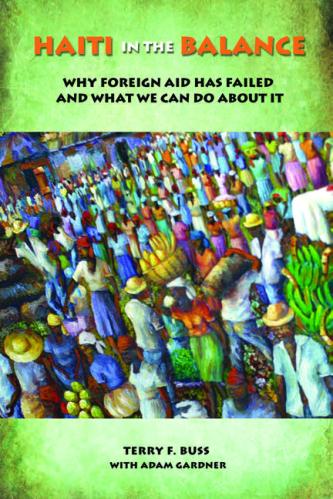
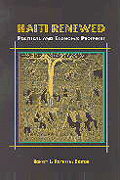
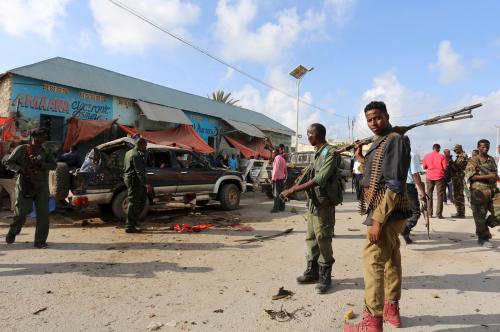
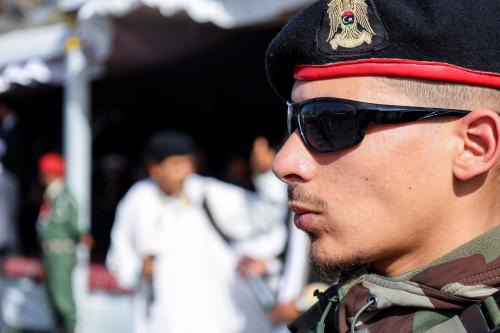
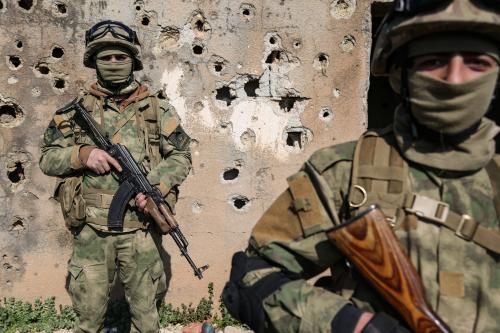

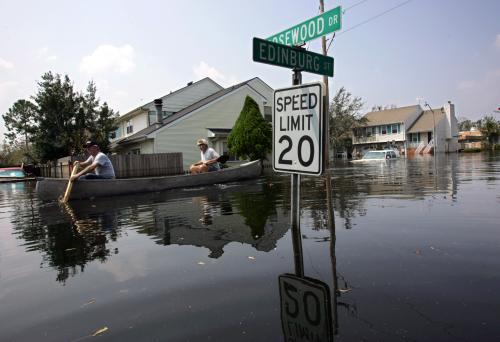
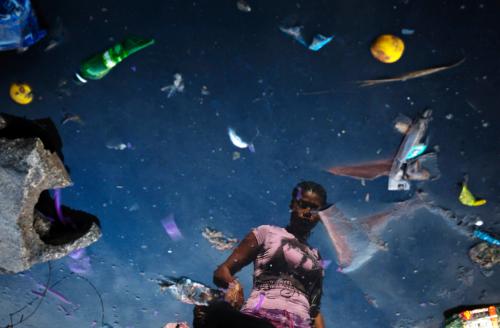
Commentary
Haiti in 2023: Political abyss and vicious gangs
February 3, 2023